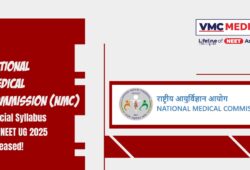NMC Introduces New Tie-Breaking Rules for NEET UG 2024
 Posted On
Posted On
434 total views, 1 views today
The National Medical Commission (NMC) has recently unveiled significant changes to the tie-breaking regulations for the National Eligibility cum Entrance Test for Undergraduate (NEET UG) examinations. These alterations, outlined in the GMER-23 Regulations, are poised to come into effect for the NEET UG-2024 session.
Traditionally, in instances where candidates achieved identical scores in NEET-UG, precedence was given to the marks obtained in Biology (comprising both Zoology and Botany), followed by Chemistry, and then Physics. This hierarchy would continue until a distinction could be made. In cases of persistent equality, factors such as negative marking and age were previously utilized to determine rankings, with the elder candidate typically receiving a higher rank.
However, the new regulations mark a departure from this established protocol. Under the revised guidelines, the order of consideration for tie-breaking purposes has been rearranged. Now, the respective marks in Physics will be the primary criterion, followed by Chemistry, and then Biology. Should the tie persist beyond this point, a randomized selection process will be implemented, employing computer-generated draws devoid of any human intervention.
This amendment reflects a proactive effort by the NMC to refine and streamline the tie-breaking mechanism, ensuring fairness and transparency in the selection process for aspiring medical students. By prioritizing the performance in Physics, the regulatory body acknowledges the significance of this fundamental subject in the medical curriculum. Moreover, the shift towards a randomized selection method underscores the commitment to impartiality, eliminating any potential bias or subjective influence.
The decision to revise the tie-breaking rules has been met with both anticipation and scrutiny within the medical education community. While some applaud the emphasis on core subjects and the introduction of a neutral selection process, others express reservations regarding the departure from the previous criteria, particularly the exclusion of negative marking and age consideration.
Proponents of the new regulations argue that the emphasis on Physics aligns with the evolving demands of medical education, where proficiency in foundational sciences is essential for comprehensive understanding and clinical application. Furthermore, the implementation of computer-generated draws eliminates the possibility of human error or bias, ensuring a fair and equitable outcome for all candidates.
Conversely, critics voice concerns over the potential implications of the revised guidelines. The exclusion of factors such as negative marking and age, which were previously used to break ties, raises questions about the comprehensiveness and equity of the selection process. Some argue that age, as a non-academic criterion, provided a fair means of differentiation, especially in cases where academic performance was identical.
Despite the varying perspectives, it is evident that the NMC’s decision represents a concerted effort to adapt and refine the selection process in line with contemporary standards and best practices in medical education. As the landscape of healthcare continues to evolve, it is imperative that admission procedures reflect the evolving needs and priorities of the profession.
Looking ahead, the implementation of the new tie-breaking rules for NEET UG-2024 will undoubtedly be closely monitored by stakeholders across the medical education spectrum. The efficacy and fairness of these regulations will be assessed based on their ability to uphold meritocracy, ensure equal opportunities for all candidates, and maintain the integrity of the medical admissions process.
Closing Thoughts
In conclusion, the NMC’s decision to introduce revised tie-breaking rules for NEET UG-2024 marks a significant milestone in the ongoing evolution of medical education in India. While the changes may provoke debate and discussion, they ultimately signify a commitment to excellence, equity, and integrity in the selection of future medical professionals.




